1. Introduction: The Enigmatic Power of Ancient Egyptian Magic
Ancient Egypt, a civilization renowned for its magnificent pyramids, intricate hieroglyphs, and powerful pharaohs, held a profound fascination with the divine. Magic played a central role in everyday life and religious practices, permeating every aspect of their world. The Egyptians believed in a powerful and interconnected universe where the gods wielded immense influence. They sought to understand and harness this power through rituals, spells, and incantations. The concept of “wisdom” in Egyptian magical texts went beyond mere knowledge. It meant understanding the hidden laws of the cosmos, the nature of the gods, and the interconnectedness of all things. This wisdom was sought after not only for personal gain but also for the greater good of the community and the balance of the universe.
2. Unveiling the Secrets: Key Magical Texts and Their Significance
The ancient Egyptians left behind a rich legacy of magical texts that provide invaluable insights into their beliefs and practices. Among the most famous and influential texts is the “Book of the Dead,” a collection of spells and rituals intended to guide the deceased through the afterlife. This text details the perilous journey of the soul through the underworld, where it must face judgment and navigate various trials. Another significant text is the “Book of Breathing,” which focuses on rituals and incantations designed to restore breath and life to the deceased. It reflects the Egyptians’ deep belief in the power of words and rituals to influence the spiritual realm. The “Book of Gates” is a guide to the afterlife, pictorially depicting the deceased’s journey through the underworld and their encounters with deities and mythical creatures. These texts illustrate the Egyptians’ desire to control their destiny, both in this life and the next, through the use of magic and ritual.
3. Gods of Wisdom and Knowledge: Patron Deities of Magical Practice
The ancient Egyptians believed that deities played a crucial role in magical practices, bestowing their power and knowledge upon those who sought their favor. Among the most prominent gods associated with magic, wisdom, and knowledge are Thoth, Maat, and Ptah. Thoth, the god of wisdom, writing, and magic, was revered as the keeper of sacred knowledge and the architect of the universe. He was depicted with the head of an ibis bird, symbolizing his intelligence and connection to the divine realm. Maat, the goddess of truth, order, and cosmic balance, represented the moral principles and laws that governed the universe. She was often depicted with a feather, symbolizing the weight of truth and justice. Ptah, the god of creation, craftsmanship, and magic, was believed to have brought order to the universe through his divine will. He was depicted with a beard and a tall, cylindrical crown, symbolizing his creative power and authority.
4. The Power of Words: Spells, Incantations, and Rituals
The ancient Egyptians believed that words possessed immense power to influence the physical and spiritual realms. Spells and incantations were carefully crafted formulas designed to invoke the favor of the gods, protect against evil, or achieve specific goals. These formulas often contained symbolic language, divine names, and specific instructions intended to guide the practitioner. Egyptian spells often utilized the names of powerful deities, believing that invoking their divine power could influence the outcome of events. The use of specific formulas and phrases was deemed essential for the success of magical rituals. Precise pronunciation and ritual actions were believed to be crucial for activating the power of the words and ensuring their effectiveness. Magical rituals were often conducted in specific locations, with special offerings and symbolic gestures intended to appease the gods and secure their blessings.
5. Healing and Protection: Magical Practices for Health and Wellbeing
The ancient Egyptians placed great emphasis on maintaining health and wellbeing, and magic played a vital role in achieving this goal. Magical texts offer a wealth of information on healing practices, disease prevention, and protection against evil. Amulets, often crafted in the shape of deities or protective symbols, were worn to ward off illness and misfortune. Herbs and spices were used extensively in both medicinal and magical contexts, believed to possess inherent healing properties and the ability to ward off evil spirits. Rituals were performed to appease the gods and seek their intercession in healing the sick or protecting the community from disease. These practices were grounded in the concept of maintaining cosmic harmony and balance, believing that disease and misfortune were often caused by an imbalance in the natural order. By addressing this imbalance through magical practices, the Egyptians sought to restore health and harmony to both the individual and the community.
6. The Afterlife and the Journey of the Soul: Magical Texts for the Deceased
The ancient Egyptians held a strong belief in the afterlife, and magic played a crucial role in ensuring a successful transition for the deceased. Magical texts, such as the “Book of the Dead,” provided guidance for navigating the perilous journey through the underworld. Spells and rituals were designed to protect the deceased from malevolent spirits, appease the gods of the underworld, and ultimately secure a place in the afterlife. The Egyptians believed that the soul would be judged by Osiris, the god of the underworld, and that the deceased’s moral conduct in life would determine their fate. Those who had lived a virtuous life would be granted eternal happiness in the Field of Reeds, a paradise filled with abundance and joy. However, those who had committed wrongdoing would face punishment and eternal suffering. Magical texts and rituals were seen as essential tools for ensuring a favorable judgment and a peaceful passage into the afterlife.




